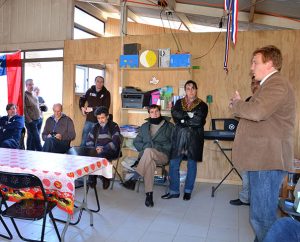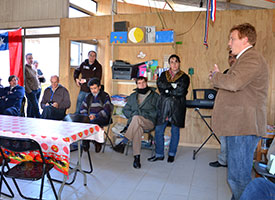By Pamela J. Nielsen
SANTIAGO, Chile — Church body leaders, pastors, seminary presidents and lay leaders — both men and women — from Argentina, Bolivia, Brazil, Chile, Guatemala, Venezuela, Panama, Paraguay, Peru and Uruguay gathered the week of Sept. 12–17 to learn about how the church can and does bear mercy in times of disaster and national tragedy. The Iglesia Luterana Confesional de Chile (ILC-Chile) served as the conference host.

The Rev. Christian Rautenberg, president of the ILC-Chile, worked closely with the Rev. Glenn Merritt, director of LCMS Disaster Response; the Rev. Dr. Carlos Hernandez, director of Church and Community Engagement with the Synod; and the Rev. Michael Meyer, new manager for LCMS Disaster Response, to plan the conference program and activities. The conference was made possible by a grant from The Lutheran Church—Missouri Synod.
The ILC-Chile is a church body that knows much about responding to disaster following the 8.8 magnitude earthquake and tsunami that rocked Chile on Feb. 27, 2010. That event affected 8 million people across the country, destroying 1.5 million buildings and houses and killing more than 700 people.
The conference began with morning prayer led by the Rev. Dr. Carlos Schumann, former president of the ILC-Chile, who preached from Mark 6:30-44, setting a pattern of daily worship and reflection on biblical texts (Luke 7:11-17, Matt. 15:21-28) that demonstrated Christ’s teaching about and acts of mercy in His earthly ministry. Other preachers included the Rev. Sergio Fritzler, president of Concordia Seminary, Buenos Aires, Argentina; the Rev. Leonerio Faller, president of Concordia Seminary, San Leopoldo, Brazil; and Rautenberg, who preached for the closing Divine Service.
Covering topics such as “Disaster Planning,” “Theology of Mercy,” “Disaster Response as Ministry,” “Planning for Disaster,” “Sharing the Gospel in the Aftermath of a Disaster” and “Care for Disaster Responders,” the conference was designed to give participants a thorough introduction to the core elements of Lutheran disaster response.
Presenters shared their own personal experiences in responding to disasters. Merritt noted that he has responded to more than 240 disasters since 2005, often with Hernandez at his side. Rautenberg and the Rev. Omar Kinas of the ILC-Chile shared their experiences born out of the 2010 Chilean earthquake and tsunami.
Speaking to the participants, many whose church bodies are small and challenged by a lack of resources, Merritt stressed that God in Christ provides both the means and the words, and emphasized that the church leaders are not alone.
The Rev. Cornelio Midence of the Guatemala Lutheran Church told the group about a Guatemalan family killed in the tornado that struck Moore, Okla., on May 20, 2013. He gratefully explained that the LCMS provided aid and assistance to the family’s relatives in returning the bodies of their loved ones home, where a Guatemalan pastor received them for burial.
Using the booklet Theology for Mercy, written by LCMS President Rev. Dr. Matthew C. Harrison, Merritt laid down the theological foundation that is the core of Lutheran disaster response.
“It’s a fundamental truth,” Merritt said, that “the church is called to share the Gospel, and that includes taking care of the needs of people but never without the Gospel — otherwise, it is social work and not the Gospel or the church’s work.”
“Pizza is nice, but it’s not the Gospel,” echoed Meyer, as he spoke on the “ministry of presence,” emphasizing that that along with the provision of material goods such as food, water, shelter, clothing and volunteers, the Gospel has to be present — the two working together as the church bears mercy.
Merritt explained that the LCMS stands as a partner — willing to share what it’s learned and ready to walk alongside its partner churches when disaster strikes — lending a hand and providing resources and funding.
The LCMS Disaster Response model and structure organized across the U.S. — which includes a network of district disaster coordinators and teams ready to respond — was presented as an example for the group to consider in planning and organizing Lutheran disaster-response protocols and procedures for the South and Central American regions, as has been done in the Asia/Pacific region.
Describing how the LCMS works on the international scene, Merritt noted, “We work through the LCMS regional directors [RDs], and when it comes to grants, we work through the RDs, the executive director of International Mission and the director of Church Relations.” Merritt added that “we only come at the invitation of the church body.”
The group traveled 350 miles south to the communities of Constitución and Talca to see firsthand the work of the ILC-Chile and LCMS disaster response in the aftermath of the 2010 earthquake and tsunami. These two hard-hit villages did not have a Lutheran presence prior to the earthquake. Today there are growing congregations in the heart of both cities, where Bible and catechism classes are taught, worship services are conducted and acts of mercy are regularly carried out within the community.
The Rev. Omar Kinas, the 24-year-old pastor for the new mission congregations in Talca and Constitución, recounted the work he and lay volunteers undertook in the days following the earthquake.
“I want to thank the other pastors from the national church [ILC-Chile], who were always calling and coming to me and supporting my work as a colleague and person,” said Kinas, a pastor for four years. “Pray for us and for the team, for our work there.”
Each Latin American leader was given an opportunity to share his thoughts and experiences in disaster response. The consensus of the group was both gratitude for the conference and eagerness to organize across the region. Seminary presidents from Brazil and Argentina expressed a desire to include the Synod’s theology of mercy and disaster-response training as part of their pastoral-formation curricula. The presidents of LCMS partner churches in Guatemala and Panama have asked for similar training in their countries yet this year.
“Sometimes we have to thank God because He shakes us, particularly in a church that preaches grace, that loves harmony, quiet and peace,” commented the Rev. Carlos Nagel, president of the Evangelical Lutheran Church of Argentina. “Let God shake us through tragedy so we can see that we are alive. Let us engage in mercy and shake our congregations so that we can all see that God puts people with needs in front of us so they can receive salvation,” said Nagel.
The next LCMS International Disaster Response Conference is being planned for October 2014 in St. Louis. The Synod’s Fifth National Disaster Response Conference is set for this year — Oct. 7-10 — in St. Louis.
Updated Sept. 27, 2013
